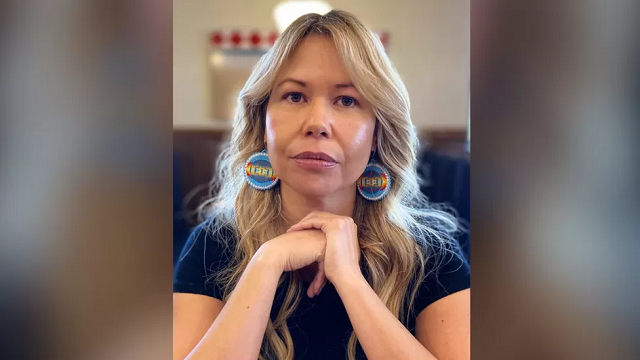
A prominent Canadian author has pleaded guilty after she was accused of kidnapping her son and faking their deaths.
Dawn Walker, an indigenous woman from Saskatchewan, was reported missing in the summer of 2022, sparking a high-profile search for her.
She was found safe in the US state of Oregon with her son two weeks later.
Walker, 49, has said that she disappeared because she was fleeing domestic violence.
Police later charged her with nine offenses, including parental abduction, identity fraud and forging a passport.
She had initially pleaded not guilty in the case.
But on Thursday, Walker entered a guilty plea to three charges in a Saskatoon court: parental abduction in contravention of a custody order, possession of a forged document, and forging a passport.
Both her lawyers and prosecutors have asked the judge for a 12-month conditional sentence, meaning she would serve time in the community, followed by an 18-month probation.
Judge Brad Mitchell must now decide on a final sentence.
‘No one heard me’
Walker was initially reported missing by Saskatoon Police on 24 July 2022. At the time, officers said she was last seen two days prior on 22 July.
They had said that her Ford F-150 and some of her belongings were found at Chief White Park in Saskatchewan, fuelling fears that Walker and her child had been harmed.
After a two-week search, which included probing the South Saskatchewan River, police announced on 5 August 2022 that Walker had been found safe with her child more than 1,000 miles (1,600 kilometres) away in Oregon City.
They had tracked her by following bank transactions for gas, food, Netflix and Airbnb rentals.
US authorities arrested Walker and charged her with two counts of identity theft – one a felony and one a misdemeanour.
She was then handed over to Canadian authorities, where she faced additional charges, while her US case was put on hold. Walker was also temporarily jailed, and her child was removed from her care.
In a court application earlier this year obtained by the BBC, Walker said she was a victim of domestic and intimate partner violence, and that Saskatchewan authorities have not protected her.
At the time, Walker released a statement to the media through a friend, saying that she “was left with no choice. No one heard me,” and she apologised to anyone who was hurt.
“I am fighting systems that continuously fail to protect me as an Indigenous woman and protect non-Indigenous men,” she added.
She added that she fled “due to her honest belief that her child faced grievous imminent harm”, and that her disappearance was the “final, most desperate attempt in a long series of fruitless bids” to seek protection from the authorities.
Saskatoon police had said that previous allegations made by Walker were “thoroughly investigated” and no charges were laid.
She was released on bail, with a trial that was scheduled to start 20 November and last until January 2024 prior to her guilty plea.
Her case has received considerable attention and support from other writers and indigenous advocates, who say that her story is a reflection of systemic failures facing women of colour in the Canadian legal system.
Ms Walker had also obtained one of Canada’s most high profile lawyers – Marie Henein – to defend her.
In an earlier statement to the media, Ms Henein reiterated that her client has sought out help from Saskatchewan authorities numerous times, “but the system failed her, like it has so many others”.
“Dawn’s voice will not be silenced,” she added.
A celebrated author and advocate
Walker, also known as Dawn Dumont, is a recognised author and indigenous advocate in Canada, with a career that spans over a decade.
While the police investigation into her continued, her latest novel, The Prairie Chicken Dance Tour, was shortlisted for a Stephen Leacock Memorial Medal for Humour, one of the oldest literary prizes in Canada.
She also holds a law degree from Queen’s University in Ontario, and ran as a federal member of parliament for the governing Liberal Party in Canada’s last election.
In a response to written questions sent to her by the BBC earlier this year, Walker refused to comment on her pending case, but she said her life’s work is influenced heavily by her experience as an indigenous woman whose family has endured racism and colonial violence.
“I’ve always worked to call attention to ongoing injustice against First Nations people and to help those who walk with me and the generations who will come after me,” she said.
“Racism and the ongoing effects of colonialism, especially within the province of Saskatchewan, need national and international attention,” Walker added.
Walker also spoke out about her experience being temporarily jailed, saying that she saw the majority of the women around her were also indigenous.
“I also saw that once in the institutions, they were mistreated,” she told the BBC, with many not being able to access lawyers or mental health and medical care.
Indigenous women are incarcerated at a rate that is 15 times higher than non-Indigenous women, according to 2021 data by Statistics Canada.
Last year, indigenous women made up half of all female inmates in Canada’s federal prisons, despite making up 5% of the overall Canadian female population.
“The numbers – though a national embarrassment – don’t tell you the real story,” Walker told the BBC. “They don’t communicate the rank frustration and pain.”
Source: bbc.co.uk






Be the first to comment